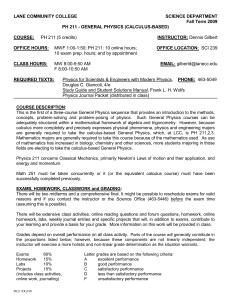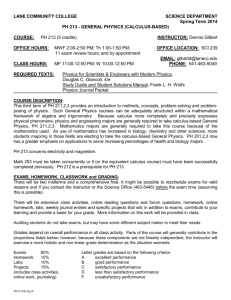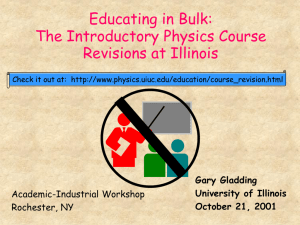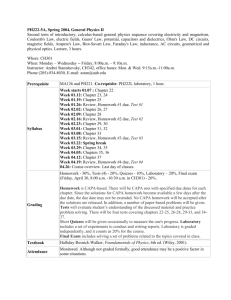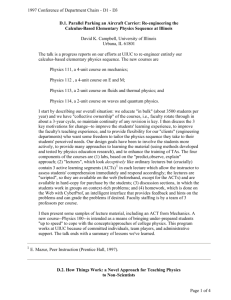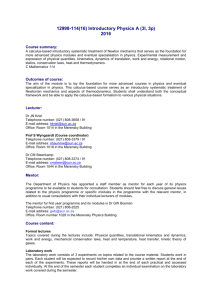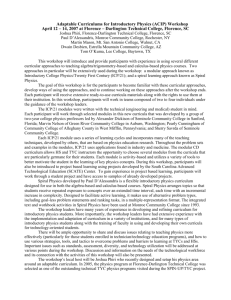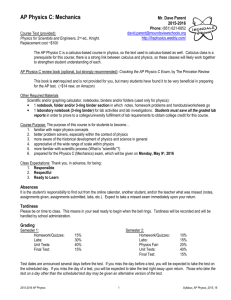Epistemology
advertisement
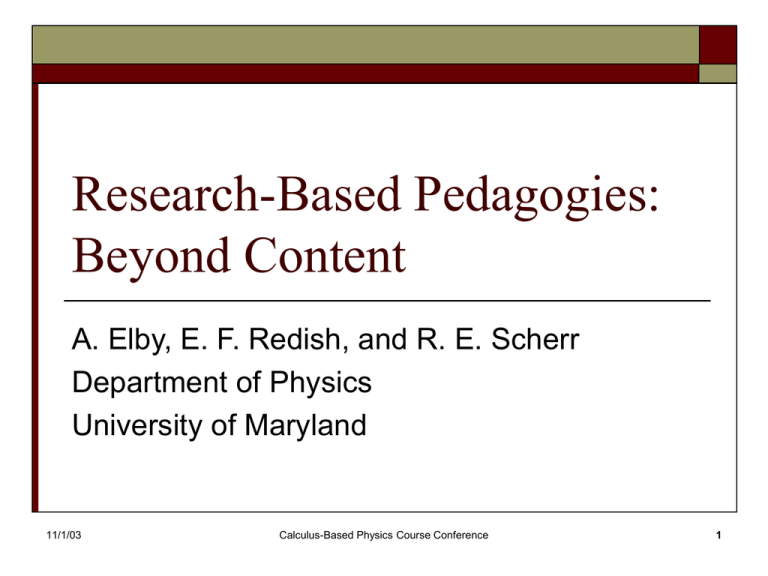
Research-Based Pedagogies: Beyond Content A. Elby, E. F. Redish, and R. E. Scherr Department of Physics University of Maryland 11/1/03 Calculus-Based Physics Course Conference 1 Plan of Presentation 11/1/03 Epistemology: Overview, Background, and Goals (Elby) Reconciling: An Example (Scherr) Building Intuition: Helping Students Reconcile (Redish) Calculus-Based Physics Course Conference 2 Epistemology: Overview, Background, and Goals Andy Elby 11/1/03 Calculus-Based Physics Course Conference 3 Goal of this workshop 11/1/03 Focus attention on a key pedagogical issue (rather than a particular curriculum) Make explicit a “hidden” reform-oriented goal other than improved conceptual understanding Calculus-Based Physics Course Conference 4 An opening example Issue: Why is student 3 having trouble learning this material? Students 2 3 1 4 QuickTime™ and a Cinepak decompressor are needed to see this picture. 11/1/03 Calculus-Based Physics Course Conference 5 Background info for video clip Class: Discussion sections, introductory college physics Activity: Guided inquiry about light and shadows. 11/1/03 What happens to bright spot on screen if bulb is moved up? What if we add a second bulb above the first? Calculus-Based Physics Course Conference 6 Background info - continued Question under consideration: “What do your observations suggest about the path taken from the light to the screen.” Right before we tune in: Discussing the two-bulb case. 11/1/03 Student 1: How do we get two images from one hole? Student 2: Light goes through hole from 2 directions. Calculus-Based Physics Course Conference 7 Why is student 3 having trouble? Students 2 3 1 4 QuickTime™ and a Cinepak decompressor are needed to see this picture. 11/1/03 Calculus-Based Physics Course Conference 8 Introduction to epistemology Epistemology = Views about the nature of knowledge and learning. Examples (Lising, Hammer): 11/1/03 Jan seems to be seeking formalism rather than a common-sense explanation. Doesn’t expect coherence between them. Daniel: “I feel that proving the formula is not really necessary for me, it doesn't matter if I can prove it or not, as long as I know that someone has proven it before . . . there's a concept, and . . . here I am paying $15,000 a year . . . . I'm not going to derive this thing for them; they're going to derive it for me and explain Calculus-Based Physics Course Conference to me how it works.” 9 Epistemology: What do you see? - 1 After solving for KE of rotating wheel using rotational kinetic energy, Ken is asked whether you could also solve it using linear kinetic energy, as explained in the book: “[You] could do it that way. Just different ways of thinking about it . . . because . . . all rotation is is just . . . at any time, it's just a bunch of particles, with velocities going off tangentially.” 11/1/03 Calculus-Based Physics Course Conference 10 Epistemology: What do you see? - 2 11/1/03 Roger solves Atwood-type problem incorrectly: The 2 tethered blocks have different accelerations. “From what I put, I guess that's right . . . . Oh geez, how could one be accelerating faster than the other . . . . That would mean the velocities would have to be different . . . . Yeah, I guess so . . . . Well, I don't know; I'd check and see if I got the right answer. I'm 90% sure.” Calculus-Based Physics Course Conference 11 Epistemology: What do you see? - 3 11/1/03 Tony finds angular velocity of an airplane flying in a straight line. Interviewer asks how it can have an angular velocity. “Here they're talking about instantaneously . . . . That's like when you sit there and watch a train come, you'll see it come, and it kind of sits there, and as it goes by, it zooms by . . . . The faster you turn your head that's what the angular velocity is.” Calculus-Based Physics Course Conference 12 Tony “reconciles” Tony “reconciles” his intuitive ideas and everyday experiences with formal physics concepts. Doing so relies upon… 11/1/03 The epistemological expectation of coherence. Background knowledge and thinking skills needed to find that coherence. (Most students need more scaffolding.) Calculus-Based Physics Course Conference 13 Remainder of this workshop 11/1/03 Experiencing a reconciliation: Putting yourselves in your students’ shoes. Example of curriculum designed to promote not just reconciliation, but also the underlying epistemological expectation of coherence. Calculus-Based Physics Course Conference 14 Reconciling: An Example Rachel Scherr 11/1/03 Calculus-Based Physics Course Conference 15 A “reconciling” task Block on frictionless ramp Task: 11/1/03 Identical block in frictionless bowl; Slope same as ramp Draw the free-body diagram for each block, and compare. Calculus-Based Physics Course Conference 16 Building Intuition: Helping Students Reconcile E. F. (Joe) Redish 11/1/03 Calculus-Based Physics Course Conference 17 Goals: What do we want our students to learn? Content Concepts What’s it “about”? How to “think physics” 11/1/03 facts, equations, principles coherence, intuition Calculus-Based Physics Course Conference 18 Instruction works! Traditional instruction focuses on content Reformed-1 instruction focuses on concepts students can successfully learn concepts and qualitative problem solving The next step: learning to “think physics” 11/1/03 students can successfully learn vocabulary, algorithms, and quantitative exercise solving Can we help students successfully learn coherence, intuition building, and complex problem solving? Calculus-Based Physics Course Conference 19 Modes of instruction Traditional Reformed-1 11/1/03 passive observation, active repetition of simple tasks active learning, qualitative reasoning cognitive conflict (elicit / confront / resolve) Calculus-Based Physics Course Conference 20 Cognitive conflict may undermine intuition building “Here’s another quiz to show me how stupid I am about physics.” “Math doesn’t lie.” “Doing science well means suppressing my intuition.” 11/1/03 Calculus-Based Physics Course Conference 21 Reform-2 Physics as a “refinement” of everyday thinking. Reconciliation rather than replacement. “Learning bifurcation” (LB) pairs 11/1/03 promote expectation of reconciliation promote expectation of seeking coherence promote respect for and development of intuition Calculus-Based Physics Course Conference 22 2 A (Reformed) 11/1/03 Tutorial Calculus-Based Physics Course Conference 23 Does it work? 1 11/1/03 Calculus-Based Physics Course Conference 24 Does it work? 2 11/1/03 Calculus-Based Physics Course Conference 25
